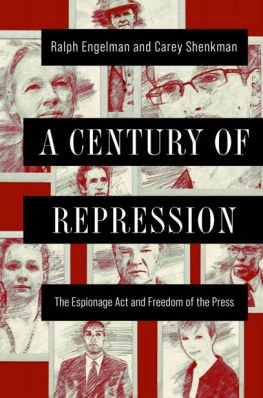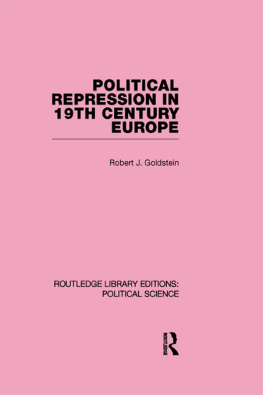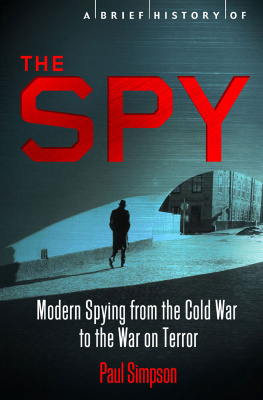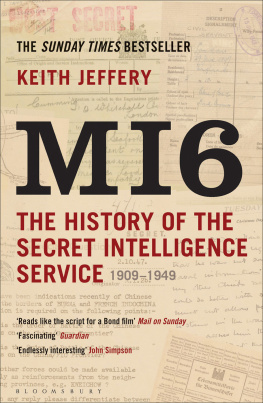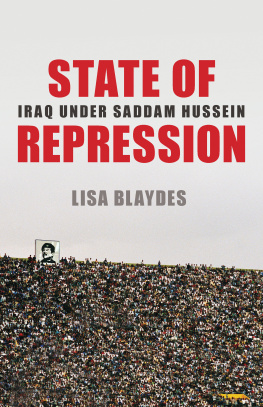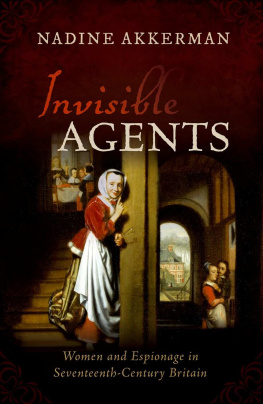A CENTURY OF REPRESSION
THE HISTORY OF COMMUNICATION
Robert W. McChesney and John C. Nerone, editors
A list of books in the series appears at the end of this book.
A CENTURY OF REPRESSION
The Espionage Act and Freedom of the Press
Ralph Engelman
and
Carey Shenkman

2022 by the Board of Trustees
of the University of Illinois
All rights reserved
Cataloging data available from the Library of Congress
ISBN 9780252044557 (hardcover)
ISBN 9780252086632 (paperback)
ISBN 9780252053566 (ebook)
Contents
A CENTURY OF REPRESSION
Introduction
The Espionage Act of 1917 is the most important yet least understood piece of legislation threatening the free flow of information in US history. To date no single study systematically traces the century-long life of the lawspanning the two World Wars, the Cold War, and the War on Terrorin regard to the threat it poses to freedom of expression. Its very name is a misnomer, since its scope extends well beyond spying. Indeed, this volume does not examine use of the act against espionage as commonly understood: spying for a foreign government. Rather we focus on those provisions criminalizing unauthorized disclosures by persons not charged with espionage, among them political dissidents, whistleblowers, and journalists. Yet the name of the law surrounds prosecutions of war critics and insider sources with an aura of disloyalty and national betrayal. The Espionage Act has repeatedly been deployed in times of war to limit free speech, a free press, and freedom of information in regard to US foreign and military policy. Its application provides a revealing lens through which to view critical moments in a century of US history. An examination of its trajectory provides new perspectives on American liberalism, the origins of J. Edgar Hoovers FBI, the emergence of the modern civil liberties movementand the need to balance First Amendment rights against claims of national security.
Since the First World War, successive administrations have deployed the Espionage Act for varied political purposes, both domestic and foreign. Some prosecutions resulted in sensational trials; others were little noticed or understood. Indeed, the act has existed under the public radar for significant lengths of time. It lives in the shadows of virtually every military conflict and foreign policy controversy in the past century. Consider this volume the biography of a law with far-reaching implications for freedom of expression in times of war. It entails the stories of targets of Espionage Act prosecutionsof Eugene Debs, Samuel L. Morison, Daniel Ellsberg, Chelsea Manning, Thomas Drake, Julian Assange, Edward Snowden, and Reality Winner, among others. The playbook of Espionage Act prosecutions is tainted with the settling of political scores, character assassination, illegal break-ins, extrajudicial death threats, and prosecutorial misconduct. Targets include government critics and internal whistleblowers as well as the journalists who covered them. Many Espionage Act prosecutions collapsed; others resulted in draconian sentences. Yet all defendants paid a high price for their ordeals in their personal and professional lives.
If there should be disloyalty, it will be dealt with with a firm hand of stern repression, Woodrow Wilson declared on April 2, 1917, in his address to a joint session of Congress calling for a declaration of war. It established a system to censor publications, administered by the US Post Office. Thus, at the urging of the Wilson administration, Congress enacted the first federal sedition legislation since the expiration and widespread repudiation of the Alien and Sedition Acts of 1798. The Espionage Act would remain a vehicle for government suppression of information and criticism regarding US foreign and military policies for the century that followed.
From the outset, the law was applied to targets both small and large. Take, for example, the case of the hapless Robert Goldstein, producer of a film entitled The Spirit of 76. Goldstein was the owner of an apparels shop that supplied costumes to early Hollywood movies, including D. W. Griffiths The Birth of a Nation. Aspiring to do for the American Revolution what Griffith had done for the Civil War and Reconstruction Era, Goldstein sunk $200,000 into a silent epic film with massive sets and a cast of hundreds about the War of Independence. It included signature moments like the signing of the Declaration of Independence, a subplot about efforts to install King Georges mistress as Queen of America, and graphic images of British atrocities. The film opened in May 1917, just weeks after US entry into the war. Goldstein was charged under the newly minted Espionage Act with attempting to harm the war effort by portraying the United States chief ally in a critical light, convicted, and sentenced to ten years imprisonment. Hollywood was being enlisted in the war effort, and even negative images of an ally set in the distant past would not be countenanced. Goldstein was released, penniless, after three years. He sought to restart his film career, first in the United States and then in succession of European countries. Both Goldstein and his film eventually disappeared from sight. Goldstein was last heard from in 1935, writing from Germany, where he could not afford to pay nine dollars to renew his passport. He is presumed to have perished in a concentration camp. No copy of The Spirit of 76 seems to have survived him.
If the trial of Robert Goldstein seems arbitrary, the prosecution of William Big Bill Haywood does not. For the business community and government officials, the radical labor leader was one of the most hated and feared figures in the nation. Haywood, a former miner and brawling revolutionary labor leader from the West, was broad-shouldered, with one dead eye and a scarred face, usually topped by a black Stetson cowboy hat. Based in the western United States, the Wobblies were a powerful force in sectors of the American economy like mining, lumber, and shipping essential to the war effort.
No wonder, then, that Haywood was tried, in Chicago in 1918, as the lead defendant together with one hundred other IWW leaders for violation of the Espionage Act before Judge Kenesaw Mountain Landis (the future commissioner of major league baseball). All were found guilty, and Haywood received a twenty-year sentence. Released on bail, he saw the US Circuit Court reject the IWW appeals. Haywood was in poor health, determined not to return to jail once again, this time possibly for the rest of his days. On March 31, 1921, disguised with a monocle over his bad eye and carrying a false passport, he boarded the S.S. Oscar II, bound for the Soviet Union via Stockholm. After working on an American-run experimental industrial colony in Western Siberia, making a speaking tour in Russia, and writing his autobiography, Haywood spent his last years languishing in Moscow at the Hotel Lux, a residence for visiting foreign leftists and exiled communists. His loneliness was tempered by alcohol and occasional visits from old comrades from home; he died in 1928.
The stories of Robert Goldstein and Big Bill Haywoodtheir differences notwithstandingillustrate the personal cost of being the target of an Espionage Act prosecution, a recurring pattern down to our own day. They also suggest the remarkable personalities and high drama often at play in Espionage Act cases, bringing to mind Philip Roths adage that American reality can trump the fiction writers imagination. This is true of the odyssey of Daniel Ellsberg and the ordeal of Chelsea Manning. Observe the mild-mannered Edward Snowden, holed up for months in Moscows Sheremetyevo Airport, after charges were unsealed against him in June 2013 for violating the Espionage Act by giving the press classified documents from the National Security Agency (NSA). Witness Julian Assange, dragged by British police from the cramped Ecuadorian Embassy in London in April 2019 to face extradition to the United States on charges under the Espionage Act. Lesser-known proceedings would also have significant ramifications, such as the

